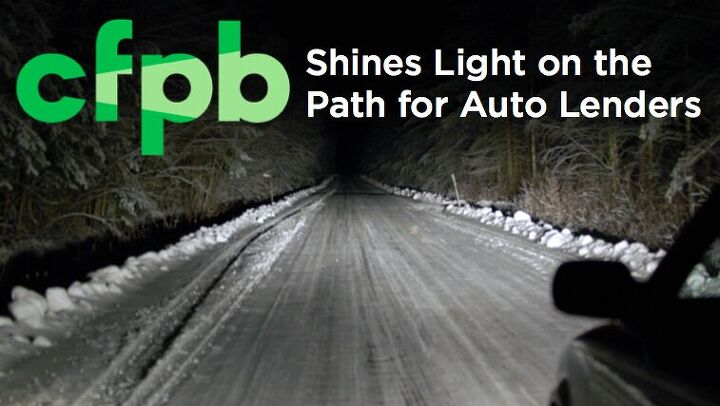The Continuing Saga of the Consumer Financial Protection Bureau and Dealer Interest Rate Markup on Car Loans, Part Two

That happy couple at the car dealership, back by popular demand.
Since we last reported on the Consumer Financial Protection Bureau (CFPB) and its controversial crusade to uncover racial discrimination by car dealers on interest rate markup on automobile loans, the agency has ordered over $100 million in fines and settlements against banks that some have deemed extortion. This has infuriated lenders and car dealers, and has frustrated lawmakers on both sides of the aisle.
The tale continued last week as the House Committee on Financial Services revealed that their work on this case now includes trying to get the CFPB and Department of Justice to agree on that age-old problem on how to get white car buyers to admit that they are actually white.
Let us review this investigation, which recently prompted the House committee to publish a report about the CFPB probe, titled “Unsafe at Any Bureaucracy: CFPB Junk Science and Indirect Auto Lending.”
The Consumer Financial Protection Bureau is a regulatory agency formed in 2010 under the Dodd-Frank Act. Its operations and $541 million annual budget are not overseen by Congress. In 2012, the agency conjured up a theory: that automobile dealers were discriminating against minority car buyers by marking up the interest rate on their auto loans at a higher rate than they were for white clients. It is believed that there are no examples of any customer complaints to the CFPB or other agencies on the matter.
Dealers work with a variety of indirect finance companies, be it a “captive” bank source like Ford Motor Credit, or a “non-captive” like Wells Fargo. The CFPB had a problem with the indirect loan process. For example, where a bank may approve a customer’s credit application from a dealership for a car loan at 3.5% APR, the dealer has the discretion to mark up the interest rate to as much as 6.0% APR, limited by the bank’s policies and state laws. The typical amount of dealer markup is around 50 to 150 basis points, resulting in a national average of between $300 and $500 per car in profit, or “dealer reserve.”
Other retail financing industries also mark up interest rates, but the CFPB no doubt chose to single out car dealers to ensure getting maximum mileage and headlines out of its crusade. Since the CFPB is barred by law from regulating automobile retailers, where cases of discrimination probably do exist, the agency decided to pursue the banks that provided the loans. Its rationale: by allowing dealer markup, the banks are responsible for discriminatory lending practices. They would thus be violation of the Equal Credit Opportunity Act.
Lenders have no way of knowing the race of a client sitting in front of a dealer’s finance manager. They are forbidden by law to ask for race on credit applications. The CFPB thus turned to a controversial statistical methodology called Bayesian Improved Surname Geocoding, a proxy based analysis which claims that knowing clients’ names and zip codes will result in an accurate determination of their ethnicity. For example, if your last name is Martinez and you live in zip code 78211 (San Antonio), you’re likely to be Hispanic. The CFPB did not consider any other variables that affect payment such as the rate, customer’s FICO score, or deal structure.
We likened this analysis to Seinfeld’s Donna Chang episode, where Jerry is surprised to learn that his blind date with a woman with a Chinese surname turned out to be a blond Caucasian woman.
The agency proceeded to dig into the books of most major auto lending institutions and found thousands of cases of perceived minority customers that paid a higher interest rate than did perceived Caucasian customers.
Between 2013 and 2015, the agency subsequently forced Ally Financial (formerly GMAC), American Honda Finance Corporation, Fifth Third Bank and BB&T Bank to fork over a total of over $100 million in fines and settlements in lieu of prosecution. The average interest rate paid by minority car buyers was around 20 to 29 basis points higher than for Caucasians. The CFPB calculated that the average amount overpaid by 420,000 consumers was $295, or $4.92 per month on a 60-month loan. Each lender refused to admit any wrongdoing.
“Banks and Car Dealers Engage In Racial Discrimination!” screamed the headlines.
Ally agreed to reimburse 235,000 customers a total of $80 million and was fined $18 million. Honda agreed to pay $24 million to consumers and to limit its dealer reserve to 125 basis points on loans up to 60 months and 100 points on longer term loans, which will do nothing to stop dealers from engaging in any discriminatory interest rate markup.
The CFPB also wanted the lenders to change the way they compensate dealers, preferably by paying dealers a flat fee for each loan, instead of a rate markup. The agency did not comprehend that this would cause many consumers to pay a higher interest rate: if Bank A approves a dealer’s client a loan at 3.5% APR with a $500 dealer flat fee and Bank B offers 4.0% APR with a $750 fee, the retailer will likely only offer the latter to the customer. (In which case, the CFPB would probably decide that minorities had paid an average higher flat fee amount and launch another investigation.) All but one small lender refused to switch to flat fees.
As the findings unfolded, the CFPB came under attack by the auto industry groups who said the agency was on a witch-hunt to regulate dealers; by members of Congress miffed that the CFPB refused to divulge details on its methodology; and by explosive claims that the agency itself practiced racial discrimination against its own employees. They annoyed the House by going $65 million over a $150 million budget for remodeling their offices, a $590 per square foot project that included sunken gardens and a waterfall.
Which brings us to the hi-jinks of this past week revealed in a report by the House Committee on Financial Services.
Last summer, the CFPB sent a notice to affected car buyers. Customers with at least a 50/50 chance of being a minority received the 15-page letter you can read here. In essence, it says, “You recently financed a vehicle and are entitled to a payment of at least $150 due to alleged discrimination in auto lending. If you do not respond, you will get the money. We think you are a minority but if you are not, you are required to fill out and return the attached form and you will receive no payment.”
The Department of Justice objected to this “opt-out” method, saying it encouraged fraud, as some white clients did not respond and thus will receive payment. They proposed all claimants self-identify under penalty of perjury. The CFPB argued that this method would lead to only 15% to 61% of the customers receiving payment. The House Committee said the DOJ’s method would expose the flaws in the CFPB’s probe.
Said the chairman of the House Committee, Republican Jeb Hensarling, “It defies logic for federal agencies to distribute settlement funds without first verifying the eligibility of prospective recipients, particularly when the bureau’s case is premised upon a flawed statistical analysis.”
A final decision is pending on which opt-in or opt-out or combination of both methodologies will be recognized to verify the race of customers and thus start processing payments.
In November, the House passed a bill rescinding the CFPB’s authority over auto lending. A total of 88 Democratic House members joined Republicans in endorsing the legislation. It is not expected to pass the Senate, plus President Obama is a staunch supporter of the agency. The Republican staff of the House Committee on Financial Services also wrote a scathing report in November entitled, “Unsafe at Any Bureaucracy: CFPB Junk Science and Indirect Auto Lending,” blasting the agency’s methodology and concluding:
The Bureau’s assault on the auto finance market is a textbook example of how regulators that don’t understand business and economics can harm the very consumers they intend to protect. According to a recent analysis of the Bureau’s settlements with Honda and BB&T by the Wall Street Journal, the end result of the Bureau’s actions could be higher interest rates for some borrowers that over the life of a four-year $25,000 credit contract would add $586 in interest payments.
To be fair, the CFPB has punished car dealers who genuinely harmed consumers by practicing shady lending practices. Last week, they took action against Herbie’s Auto Sales, a Colorado buy-here pay-here lot, for engaging in a myriad of abusive financing schemes.
In addition, the publicity over the settlements has caused many auto dealers’ finance departments to concentrate more on selling aftermarket products — such as extended warranties and GAP protection — rather than profiting from dealer reserve, though the CFPB is said to be looking at those products as their next target.
If you think this case is much ado about nothing, consider this: suppose the government decides to apply the CFPB’s methodology to determine if there is a disparity in the average price paid on new vehicles by minorities vs. non-minorities. It would be a story of such magnitude that Volkswagen would be knocked right out of the headlines.

More by Steve Lynch
Latest Car Reviews
Read moreLatest Product Reviews
Read moreRecent Comments
- Lorenzo The unspoken killer is that batteries can't be repaired after a fender-bender and the cars are totaled by insurance companies. Very quickly, insurance premiums will be bigger than the the monthly payment, killing all sales. People will be snapping up all the clunkers Tim Healey can find.
- Lorenzo Massachusetts - with the start/finish line at the tip of Cape Cod.
- RHD Welcome to TTAH/K, also known as TTAUC (The truth about used cars). There is a hell of a lot of interesting auto news that does not make it to this website.
- Jkross22 EV makers are hosed. How much bigger is the EV market right now than it already is? Tesla is holding all the cards... existing customer base, no dealers to contend with, largest EV fleet and the only one with a reliable (although more crowded) charging network when you're on the road. They're also the most agile with pricing. I have no idea what BMW, Audi, H/K and Merc are thinking and their sales reflect that. Tesla isn't for me, but I see the appeal. They are the EV for people who really just want a Tesla, which is most EV customers. Rivian and Polestar and Lucid are all in trouble. They'll likely have to be acquired to survive. They probably know it too.
- Lorenzo The Renaissance Center was spearheaded by Henry Ford II to revitalize the Detroit waterfront. The round towers were a huge mistake, with inefficient floorplans. The space is largely unusable, and rental agents were having trouble renting it out.GM didn't know that, or do research, when they bought it. They just wanted to steal thunder from Ford by making it their new headquarters. Since they now own it, GM will need to tear down the "silver silos" as un-rentable, and take a financial bath.Somewhere, the ghost of Alfred P. Sloan is weeping.



































Comments
Join the conversation
KUDOS to Steve Lynch for his EXCELLENT treatment of this issue.
RE: "Anyway, the problem of dealer rate markup practices disproportionately screwing minority buyers is neither new nor fanciful" CFPB didn't say the margin itself constituting a "screwing." They say the third of a percent of margin," based on their suspect methodology, constituted unintentional, non willful, "disparate impact" discrimination on the part of the lender because the lender enabled the dealers by compensating them for their loan origination services with a system that allowed for that unintentional discrimination. If everyone paid 3% margin, CFPB would be happy with it. But that goes against what the FTC stands for. They won't allow "price fixing." They want to the consumer to be able to shop. You have two government agencies at odds with the DOJ supportive of "discriminate impact." Dealers are caught in the middle. Lenders don't know what to do. CFPB says going to flat fees doesn't work for them. Honda agreed to shorten their margin availability to 1.25%. But that still keeps the door open for unintended discrimination if a protected class isn't as good at negotiating as the consumer populace at large. They won't allow "protected class" membership cards to be issued and make dealers and lenders guess at who is and isn't a member. Even if there were membership cards issued, there are no directions on how CFPB wants them treated. Its damned if you do and damned if you don't. Frankly, the industry is mostly killing time until the next administration. At some point, disparate impact will hit a bump in the road in the courts OR CFPB will have to furnish the internal documentation they've been sitting on OR a court will come down hard on BISG. Any of the Republicans will kill it. So will Hillary. Bernie? Not so much. If he's elected the issue will have to go to the courts. I'd hate for CFPB to be derailed overall by this singular over reach. I've even been an affirmative action guy for decades. But this kind of stuff makes me rethink even that. Just tell us how to identify protected classes without having to guess and tell us what to do with them. And while you're at it, get your solution to pass muster with the FTC and DOJ.